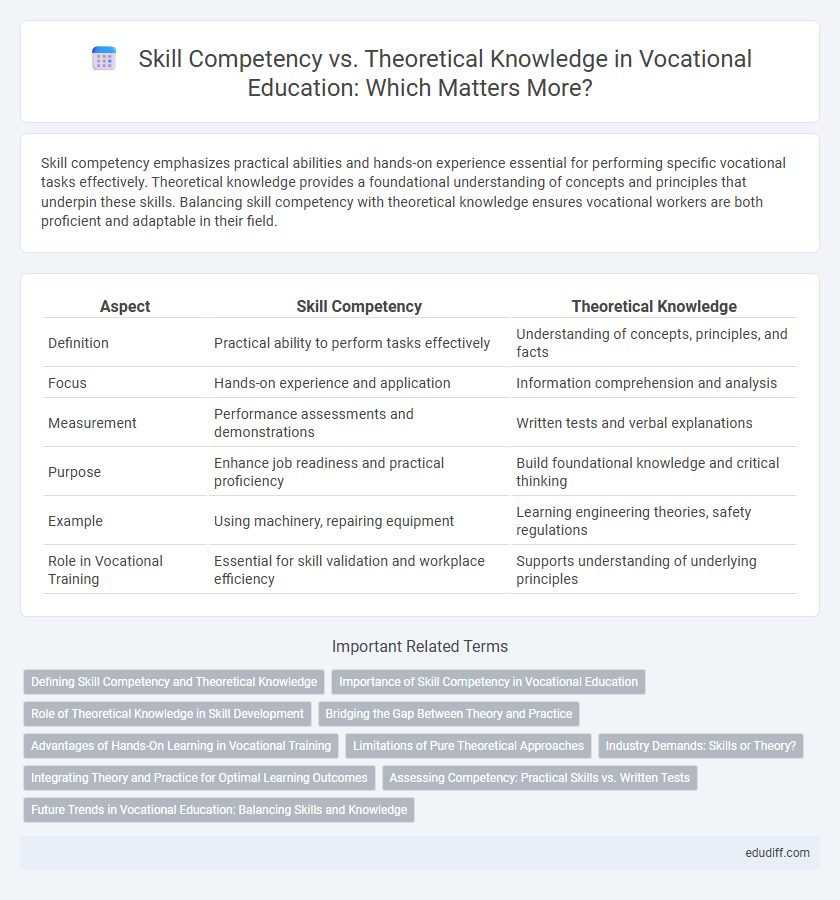Skill competency emphasizes practical abilities and hands-on experience essential for performing specific vocational tasks effectively. Theoretical knowledge provides a foundational understanding of concepts and principles that underpin these skills. Balancing skill competency with theoretical knowledge ensures vocational workers are both proficient and adaptable in their field.
Table of Comparison
| Aspect | Skill Competency | Theoretical Knowledge |
|---|---|---|
| Definition | Practical ability to perform tasks effectively | Understanding of concepts, principles, and facts |
| Focus | Hands-on experience and application | Information comprehension and analysis |
| Measurement | Performance assessments and demonstrations | Written tests and verbal explanations |
| Purpose | Enhance job readiness and practical proficiency | Build foundational knowledge and critical thinking |
| Example | Using machinery, repairing equipment | Learning engineering theories, safety regulations |
| Role in Vocational Training | Essential for skill validation and workplace efficiency | Supports understanding of underlying principles |
Defining Skill Competency and Theoretical Knowledge
Skill competency refers to the practical ability to perform specific tasks effectively, demonstrated through hands-on experience and real-world application. Theoretical knowledge encompasses understanding concepts, principles, and information, typically gained through formal education and study. Combining both ensures a comprehensive vocational education that prepares individuals for proficient job performance.
Importance of Skill Competency in Vocational Education
Skill competency in vocational education directly enhances practical abilities, equipping learners to effectively perform job-specific tasks and adapt to real-world challenges. Mastery of hands-on skills increases employability and productivity, bridging the gap between theoretical knowledge and workplace demands. Emphasizing skill competency ensures that vocational graduates meet industry standards and contribute meaningfully to economic growth.
Role of Theoretical Knowledge in Skill Development
Theoretical knowledge forms the foundation for skill competency by providing the principles and frameworks essential for practical application in vocational training. Understanding core concepts enhances problem-solving abilities and adaptive skills in diverse work environments. Integrating theory with hands-on practice accelerates mastery and ensures sustainable skill development.
Bridging the Gap Between Theory and Practice
Skill competency enhances employability by enabling individuals to apply theoretical knowledge in real-world scenarios, ensuring practical problem-solving and effective task execution. Vocational training programs that integrate hands-on experience with academic instruction bridge the gap between theory and practice, fostering deeper understanding and improved job performance. Emphasizing competency-based assessments over purely theoretical evaluations leads to a workforce better prepared to meet industry demands and adapt to evolving technologies.
Advantages of Hands-On Learning in Vocational Training
Hands-on learning in vocational training enhances skill competency by providing practical experience that bridges the gap between theoretical knowledge and real-world application. This approach improves muscle memory, problem-solving abilities, and adaptability in dynamic work environments. Employers value trained professionals who demonstrate proficiency through applied tasks, increasing job readiness and career success.
Limitations of Pure Theoretical Approaches
Pure theoretical approaches in vocational training often lack practical application, limiting learners' ability to develop hands-on skills essential for job performance. The absence of real-world scenarios reduces the opportunity to build muscle memory and adapt to workplace dynamics. Consequently, skill competency remains underdeveloped despite strong theoretical understanding, highlighting the need for integrated experiential learning.
Industry Demands: Skills or Theory?
Industry demands prioritize skill competency over theoretical knowledge, as hands-on abilities directly impact job performance and productivity. Employers seek candidates proficient in practical tasks such as equipment operation, troubleshooting, and real-world problem-solving that align with current market needs. While theoretical knowledge supports understanding, the emphasis remains on applied skills that drive efficiency and innovation in vocational roles.
Integrating Theory and Practice for Optimal Learning Outcomes
Skill competency develops through hands-on experience, enabling learners to apply theoretical knowledge in real-world scenarios effectively. Integrating theory and practice ensures that educators design curricula promoting active engagement and contextual understanding. This approach enhances problem-solving abilities and prepares students for dynamic vocational challenges.
Assessing Competency: Practical Skills vs. Written Tests
Assessing competency in vocational training emphasizes evaluating practical skills through hands-on tasks that mirror real-world job requirements, providing a direct measure of a candidate's ability to perform specific functions. Written tests primarily assess theoretical knowledge and understanding of concepts, but may not fully capture the application of skills in practical scenarios. Combining performance-based assessments with written evaluations ensures a comprehensive measurement of both skill competency and theoretical understanding critical for vocational success.
Future Trends in Vocational Education: Balancing Skills and Knowledge
Future trends in vocational education emphasize integrating skill competency with theoretical knowledge to prepare learners for rapidly evolving industries. Emphasizing hands-on experience alongside foundational theories enhances adaptability and innovation in sectors like technology and renewable energy. This balanced approach addresses workforce demands by fostering both practical proficiency and critical thinking skills essential for emerging job markets.
Skill competency vs Theoretical knowledge Infographic

 edudiff.com
edudiff.com